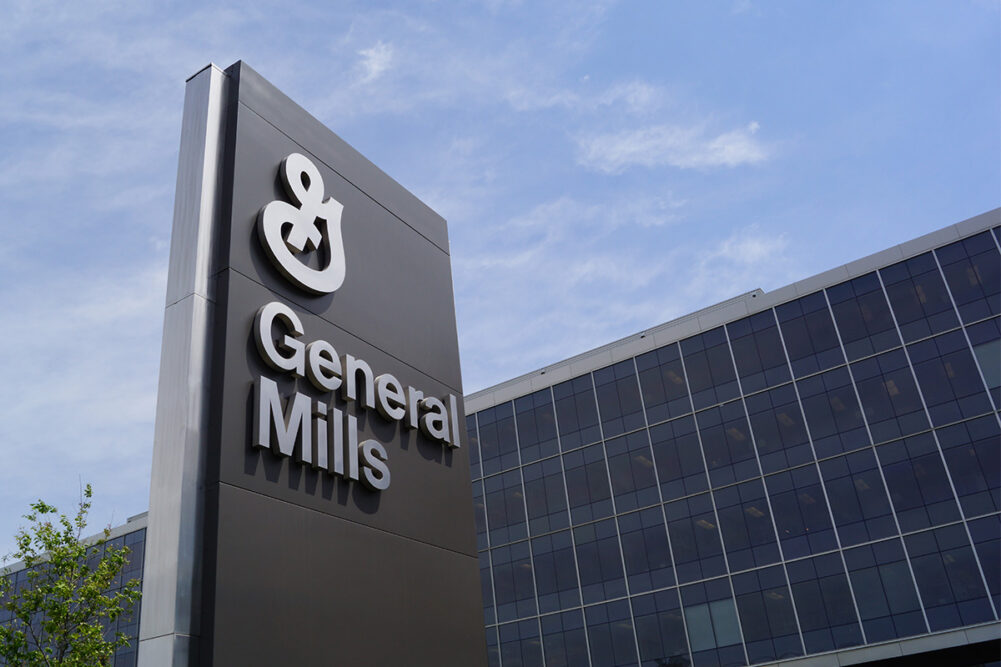NEW YORK — Credit Suisse has lowered its target price on Minneapolis-based General Mills, Inc. to $62 from $64 “to reflect a lower valuation multiple.” Meanwhile, the ratings agency maintained its “outperform” outlook for the company.
“During our meetings, management laid out a strong case for why the company is now in a fundamentally better place than it was prior to 2020,” Robert Moskow, research analyst at Credit Suisse, wrote in a Jan. 15 report. “We think the company deserves a lot of credit for maintaining a steady pace of investment in advertising, data analytics, and e-commerce before and during the pandemic. Sales growth, market share gains, and balance sheet improvement have enabled the company to develop capabilities faster than it normally would have.
“We are maintaining our above-consensus EPS estimate for FY 22 to reflect our view that these improvements have put the company on stronger ground than its peers. However, we lower our valuation multiple to further reflect the volatile dynamics we see ahead for pricing, inflation and demand in the broader food sector.”
Mr. Moskow said General Mills’ management has conveyed the feeling that it will be able to offset rising inflation. Despite expectations that spot prices for grains, fuel and other commodities may experience sequential inflation, General Mills believes it is in a good position with hedges in place on 75% of its exposure, Mr. Moskow said.
He said Credit Suisse anticipates inflation hitting 5% to 6% in fiscal 2022, which would be well off from the 10% to 11% that caused a profit warning in fiscal 2021.
“As offsets, management pointed to productivity of 4% to 5%, enhanced strategic revenue management capabilities, and the ability to raise list pricing if warranted on selected items,” he said. “It also emphasized stronger relationships with retailers due to the performance of its supply chain during the pandemic. And contrary to the concerns we raised in our 2021 Outlook, management said it has not seen any indicators of retailers demanding bigger vendor allowances to help fund their e-commerce investments.”
Portfolio reshaping remains a priority at General Mills, Mr. Moskow said. Specifically, Jeffrey Harmening, chief executive officer, has emphasized that the company still needs to make tack-on acquisitions and divestitures to achieve its long-term growth targets. While Mr. Harmening hasn’t divulged what the company’s acquisition targets may be, he has indicated that they are likely to be smaller transactions than the company’s $8 billion Blue Buffalo acquisition in 2018, Mr. Moskow said. On the divestiture front, Mr. Moskow said Credit Suisse believes General Mills would consider selling Yoplait International at the right price.
A topic that continues to dominate conversation around packaged foods companies’ outlooks is post-pandemic performance. Mr. Moskow said General Mills’ management is optimistic that categories that have gained a boost from at-home eating behaviors, such as ready-to-eat cereal and soup, will continue to thrive. But the ratings agency is less sure, noting that consumers are becoming increasingly fatigued with the repetition of at-home meals and eager to return to their prior eating behaviors once the COVID vaccines are more readily available.
“Management didn’t disagree with our opinion, but said that we might be underestimating the longer-term benefit to their categories from employers instituting more flexible at-home work arrangements and reduced business travel,” Mr. Moskow said.





